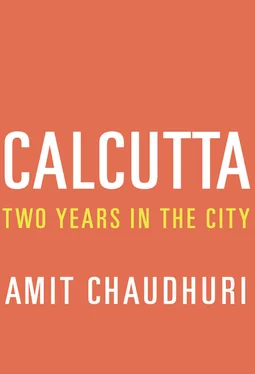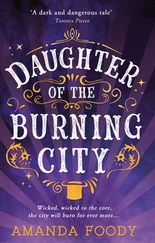* * *
The Bengal Renaissance’s largely unnoticed state of existence — where the larger world and India’s colonial rulers were concerned — might explain its cherishing of secrecy, of looking, and spying, and its air of surreptitious playfulness — its very illegitimacy. And it may also be why, especially, the afternoon was a time of enchantment in Calcutta, pregnant with meaning for the Bengali child, when the adult, the figure of authority, had withdrawn, and the child was granted solitary freedom within a fixed ambit.
Charulata, in Satyajit Ray’s eponymous film, diverts herself in the afternoon in an immense nineteenth-century mansion in North Calcutta by opening the slats of the windows and spying on passers-by through binoculars. To be unseen, to look out at the world: for the artist, this is a prized privilege, and, in the late nineteenth century, Calcutta began to feel those possibilities — of being at once known and invisible — precipitously. This was the mood of that anomalous renaissance: the atmosphere — captured in Charulata’ s opening frames — of afternoon and concealment. “Freedom consists in not having to make the laws,” said Tolstoy. So with the Bengalis in that age. Isn’t that why Tagore constantly mentions chhuti (holidays), khela (play), and the relief of kaaj nai (having no work to do) in his songs — because the colonial world has granted him an odd kind of liberation?
Is that the reason, too, why Calcutta was associated in my mind with play and freedom; or was it because I came here for my holidays? Exactly what kind of experience is a holiday?
A holiday is an interruption. It isn’t a narrative with a denouement — that’s what ordinary life is. A holiday is a break from “ordinary life.” Part of its enchantment, surely, is that it doesn’t follow the rules of narrative that “ordinary life” does; it’s a period of time that’s static, unmoving, without the on-and-on progression that our lives generally have — but a period, nevertheless, in which a transformation occurs. A holiday doesn’t so much entail a journey to a foreign place as a certain change in mood that causes familiar and everyday things to become foreign. It’s this transformation that Calcutta once represented for me.
If I were to rehearse this in generic terms, I suppose what I’m describing is the difference between the poetic and the narrative. For me, the poem is neither rhyme, metre, nor beautiful words strung together, but a period of time in which nothing seems to happen in the conventional sense, but which we’re still changed by: a duration in which we’re altered. Unlike the novel, the transformation isn’t actually dependent on us having come to know a great deal more by the time we’ve finished reading the poem. Yet we’re aware, when we’ve reached the end of the poem, of a change having taken place.
My holidays in Calcutta were similar to my account of inhabiting a poem, in that I didn’t come to know a great deal more during them; in fact, Calcutta, being a break from school, was, for me, a break from knowing.
When I look at my novels, I see that they’re mostly — without my having consciously planned them in that way — structured around journeys and visits, rather than stories and plot. My stories aren’t about day-to-day life, but breaks and interruptions in the business of living, often caused by a change of venue. The changed venue may or may not cause a transformation (depending on how successful the novel is in its workings, and what its intentions are), but this transformation, if it occurs, probably plays the same role in my novels that plot does in others’. It’s an idea of storytelling based — I see now more clearly — on the holiday, rather than on narrative. It must carry with it some residue of the strange, disorienting excitement I felt, as a child, in Calcutta.
* * *
My first novel was, in fact, about two trips undertaken by a child to Calcutta: a boy very much like me, who is not, however, at the centre of the novel. At the novel’s centre is not even Calcutta, but the holiday itself, which on some level becomes indistinguishable, for the boy, from the city; and for me, the writer, from the novel.
Afternoon Raag , my second novel, was about student life in Oxford: but I see that it treats student life not as something with a proper beginning and end, but as a break from ordinary life; the contrast to ordinary life, with its canonical ambitions and disappointments, seems to be student life’s principal definition. Even Oxford, a foreign location for the narrator, is full of foreign locations, like East Oxford, and a mere journey to these brings into effect, in the narrator’s mind, a metamorphosis.
In Freedom Song , I returned to Calcutta, to explore a number of metamorphoses — political and economic — that had made the city subtly different from itself: fifteen years of Left Front rule, and the departure of industry; the liberalisation of the Indian economy and the ushering in of the free market; the demolition, by right-wing hooligans of the Sangh Parivar, of the Babri Masjid in Ayodhya. Responding to all of this was a young man, Bhaskar, who, instead of taking up a job, had, to the consternation of his family, joined the Communist Party and was doing street-theatre. I wanted to make Bhaskar a Quixote-like figure, in that he’d embrace the codes and tenets of Marxism and be fired by them in a world in which they’d been rendered obsolete, just as Quixote had taken up the dead chivalric codes of the romance novels in all earnestness, unmindful of their complete irrelevance. Perhaps I failed, but my intention was to show that politics and play were inseparable for Bhaskar, just as saving the world, chivalry, and fantasy were for Quixote: and I wished to offer the reader not Bhaskar’s life-story, but that charged interruption in the winter in which this confusion occurs.
Freedom Song itself is structured around a trip, or a visit. For it has another story besides Bhaskar’s. Two elderly unmarried sisters, Shanti and Mini, schoolteachers, live in North Calcutta. The younger of them, Mini, is troubled by arthritis. Her childhood friend, Khuku, who now lives in South Calcutta, in an apartment in Ballygunge, urges Mini to take a break, and to spend some time with her till her pain subsides. This idea of a change of venue excited not only Mini and Khuku, but primarily myself. It seemed to hold out more promise than plot did. As with Bhaskar, I wouldn’t give the reader Mini’s life-story, but simply record her stay as if I were recording a change, a transformation. The genre of the novel, for me, wasn’t a story; it was created around a visit.
I’d based the characters in Freedom Song on people I knew and was even related to; I decided to keep three names unchanged. Khuku, my mother’s pet name; and Shanti and Mini. To refer to and in a sense address them by their first names gave me a specific, private joy.
One reason for doing so was the generation these three belonged to, and the kind of women they were. Although they were unlike one another, they shared certain characteristics, such as an immense breadth of knowledge of Bengali literature, of its classic names, like Bankimchandra and Saratchandra and Bibhutibhushan (all referred to with easy familiarity by their first names — as is the Bengali convention), and also its slightly less canonical ones, like Manoj Basu and Premankur Aturthi. They also had a fair knowledge of classical heritage, especially Shanti mashi, who could speak of the Mahabharata as if it were a text by Shakespeare, in terms of character, psychology, and conflict. Mini mashi and my mother in particular had a tendency towards laughter; although Mini mashi, having been a schoolteacher, was slightly pedantic, while my mother, never having fared well at school, was less reverent. But they could also be perverse and stubborn; and they were, I think (even Mini mashi, despite her affiliation to a school run by the Sister Nivedita order), completely irreligious, with, shockingly, no regard for any kind of religion or god (this is particularly true of my mother) whatsoever. All in all, they were like some kind of new genre that had emerged in the late nineteenth or early twentieth century — like a film by Ghatak or Renoir, or a painting by Paul Klee, or a poem by Jibanananda Das, or a song by Cole Porter or Himangshu Dutta. They were perennially new. So it felt right to keep, and refer to them by, their first names in the novel, in order to hint at the paradox, in these ageing women, of that youthfulness and surprise. Can the modern ever grow old, and less appealing? For this reason, too, I found it easy to be friends with them in real life — with my mother, with Mini mashi and Shanti mashi — because, once I saw it, I was attracted to that newness in them, that dimension of the strange and delightful, as I was drawn, when I found it, to it in Mrs. Dalloway and “At the Bay” and “Banalata Sen.” They so belonged to the new kind of writing they’d admired while growing up, which had burgeoned in Bengal and other parts of the world, that it was almost logical for me to rediscover them in fiction, in my own writing.
Читать дальше












